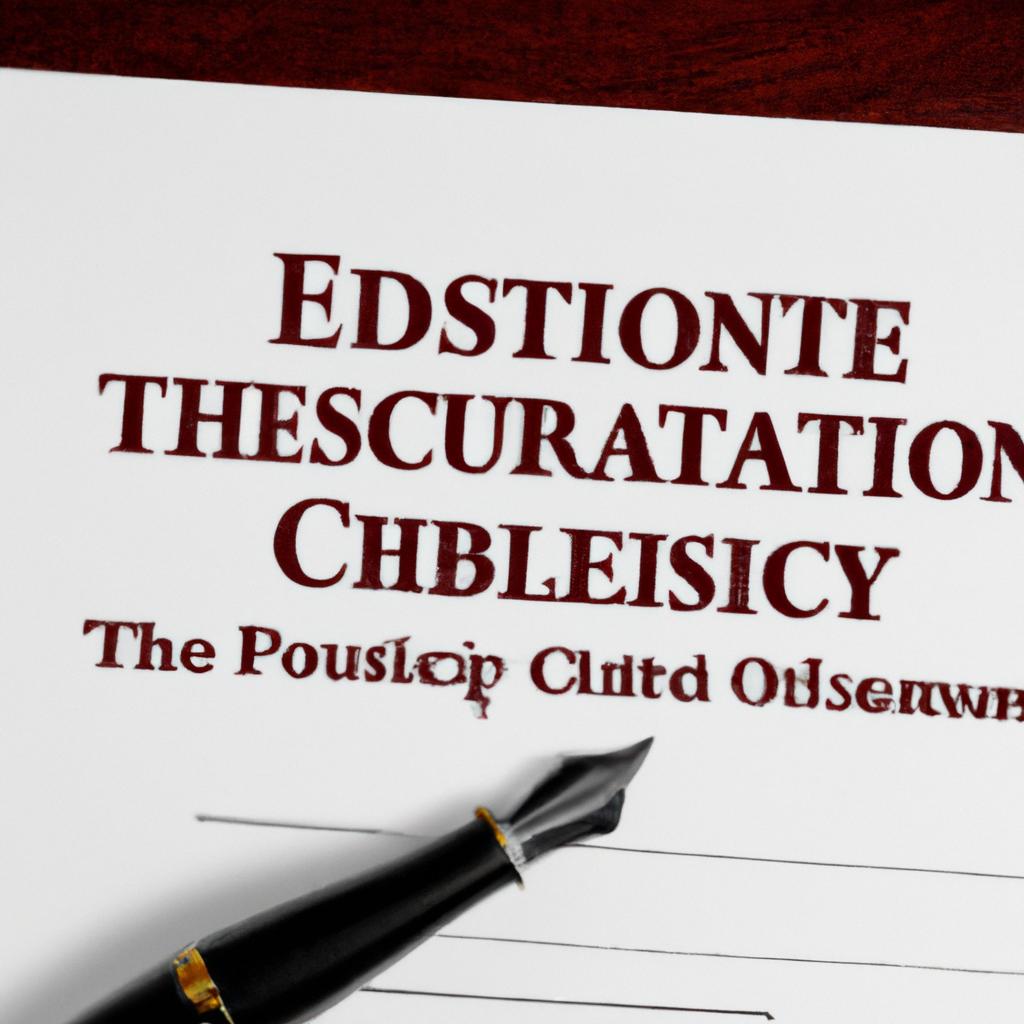In the intricate tapestry of estate planning, the act of bequeathing to charity stands as a testament to one’s philanthropic spirit and desire to leave a lasting impact on society. As seasoned practitioners in the realm of estate law, our firm, Morgan Legal Group, based in the vibrant heart of New York City, is well-versed in the nuances of crafting a charitable bequest that aligns with our clients’ values and goals. Join us as we delve into the complexities and rewards of incorporating charitable giving into your estate plan.
Understanding Bequest to Charity in Estate Planning
When considering estate planning, one important aspect to understand is the concept of making a bequest to charity. This involves leaving a portion of one’s assets or property to a charitable organization as part of their estate plan. Charitable bequests can be a meaningful way to support causes that are close to your heart and leave a lasting impact on the world.
There are several ways to make a bequest to charity in your estate plan, including:
- Designating a specific dollar amount or percentage of your estate to a charity
- Naming a charity as a beneficiary of a life insurance policy or retirement account
- Creating a charitable trust that will benefit a charity while providing income to your loved ones

Benefits of Including Charitable Bequests in Your Will
If you are considering how to leave a lasting impact after your passing, including charitable bequests in your will is a powerful way to support causes that are important to you. By designating a specific amount of money, property, or a percentage of your estate to a charity of your choice, you can ensure that your legacy lives on through the organizations and causes you care about.
There are several benefits to including charitable bequests in your will, including:
- Tax Benefits: Charitable bequests can help reduce estate taxes, as the value of the charitable donation is deducted from the total value of your estate.
- Philanthropic Legacy: By leaving a bequest to a charity, you create a lasting impact that continues to support important causes long after you are gone.
- Fulfillment of Personal Values: Including charitable bequests in your will allows you to align your financial legacy with your personal values and beliefs.

Key Considerations When Making a Charitable Bequest
When making a charitable bequest, there are several key considerations to keep in mind to ensure your wishes are carried out effectively. One important factor to consider is identifying the specific charity or charities you wish to support. It is essential to research and select organizations that align with your values and goals to make a meaningful impact.
- Choose a reputable charity: Selecting a well-established and reputable charity can help ensure that your bequest is used effectively and efficiently.
- Specify the use of funds: Clearly outlining how you want your donation to be used by the charity can help prevent any misunderstandings or mismanagement of funds.
Another crucial consideration is determining the type of bequest you want to make. Whether it is a specific bequest, residual bequest, contingent bequest, or restricted bequest, each type has its own set of implications and legal requirements that should be carefully considered.
| Type of Bequest | Definition |
|---|---|
| Specific Bequest | Leaving a specific dollar amount or asset to a charity. |
| Residual Bequest | Donating a percentage of your estate to a charity after other bequests and expenses are paid. |
| Contingent Bequest | Providing for a charity only if certain conditions are met (e.g., if other beneficiaries predecease you). |
| Restricted Bequest | Setting limitations on how the charity can use the funds you bequeath. |

Ensuring the Proper Execution of Your Charitable Bequest
In order to ensure the proper execution of your charitable bequest, it is crucial to follow these key steps:
- Specify the Charity: Clearly identify the charity or charities that you wish to include in your bequest.
- Consult with an Attorney: Seek guidance from an experienced estate planning attorney to draft a comprehensive will or trust that includes your charitable intentions.
- Review and Update Regularly: Periodically review and update your estate plan to reflect any changes in your charitable preferences or financial circumstances.
By taking these proactive measures, you can ensure that your charitable bequest is carried out according to your wishes and has a lasting impact on the causes you care about.
Q&A
Q: What is a bequest to charity?
A: A bequest to charity is a gift left in a will to a charitable organization.
Q: Why do people choose to make bequests to charity?
A: People choose to make bequests to charity as a way to support causes that are important to them and leave a lasting impact on their community.
Q: Are there different types of bequests that can be made?
A: Yes, there are several types of bequests that can be made, including specific bequests, residuary bequests, and contingent bequests.
Q: How can someone make a bequest to charity?
A: To make a bequest to charity, individuals can include specific language in their will specifying the amount or percentage of their estate they wish to leave to a charitable organization.
Q: Can a bequest to charity be revoked?
A: A bequest to charity can be revoked or changed at any time before the individual passes away by updating their will.
Q: Are there any tax benefits to making a bequest to charity?
A: Yes, making a bequest to charity can have tax benefits, as charitable donations are typically tax-deductible.
In Retrospect
In conclusion, leaving a bequest to charity is a meaningful way to support causes that are important to you and leave a lasting impact on the world. Whether you choose to support environmental conservation, education, or healthcare, your generosity can make a difference for generations to come. Consider including a charitable bequest in your estate planning to continue your legacy of giving even after you’re gone. Your support can help create a brighter future for those in need and ensure that your values and passions live on. Thank you for considering the power of charitable giving through bequests.
 What is a Bequest to Charity and How Can It Make a Positive Impact?
What is a Bequest to Charity and How Can It Make a Positive Impact?
Charitable giving has been an essential aspect of society for centuries. People have always felt the need to give back to their communities and help those in need. One of the most significant ways to support charitable causes or organizations is through a bequest. In simple terms, a bequest to charity is the donation of money or assets to a charitable cause or organization through a will or estate plan.
Charitable bequests are a powerful way to leave a legacy and support causes that you care about. Not only do they benefit the receiving charity, but they also offer tax benefits to the donor and their heirs. In this article, we will explore the concept of a bequest to charity, its benefits, and practical tips for incorporating it into your estate planning.
Why Make a Bequest to Charity?
There are numerous reasons why people choose to make a bequest to charities. Some do it to show gratitude for the support they received from a particular organization during their lifetime. Others do it to honor the memory of a loved one who had a passion for a particular cause. However, the most significant reason is the desire to make a positive impact and leave a lasting legacy.
Bequests to charities vary in size, but even a small contribution can make a significant impact. By including a charity in your estate planning, you are supporting its long-term sustainability and ensuring that its positive impact will continue for generations to come.
Benefits of Making a Bequest to Charity
Making a bequest to charity brings several benefits to the donor, the charity, and the community as a whole. Some of the key advantages include:
1. Tax Benefits
One of the most significant benefits of including a charity in your estate planning is the potential tax savings. In many countries, charitable bequests are exempt from taxes, making it a tax-efficient way to donate. It also reduces the estate’s value, which may lower the estate tax bill for your heirs. Consult with a tax advisor to determine the tax benefits of a bequest to charity in your specific situation.
2. Flexibility in Giving
A bequest allows you to support a charity without giving up your assets during your lifetime. You can budget for your expenses and take care of your loved ones while still ensuring that your charitable giving goals are met. Also, bequests can be easily modified or revoked if your circumstances change.
3. Legacy and Impact
Making a bequest to charity allows you to leave a lasting legacy and make a meaningful impact on causes that are important to you. You can support an organization or cause that aligns with your values and passions, creating a positive impact that lasts beyond your lifetime.
4. Potential Personal Benefits
In addition to the tax benefits and legacy impact, there may be personal benefits to making a bequest to charity. Many people find joy and a sense of fulfillment in contributing to a greater cause. It can also help you feel connected to your community and make a meaningful difference in the world.
Practical Tips for Incorporating a Bequest to Charity into Your Estate Planning
Now that we have explored the benefits of making a bequest to charity, let’s dive into the practical aspects of incorporating it into your estate planning.
1. Plan Carefully
Before making a bequest to any charity, it is essential to conduct thorough research and plan carefully. Consider what causes are meaningful to you, which charities align with your values, and how much you can allocate for a bequest while still supporting your loved ones. Consult with a financial or legal advisor to ensure your charitable giving is structured correctly.
2. Communicate with the Charity
If you have a particular charity in mind, it is crucial to communicate with them about your intentions. This can help ensure that your bequest is utilized in a way that aligns with your wishes and helps the organization plan for the future.
3. Consider Different Ways to Give
There are numerous ways to make a bequest to charity. You can donate a specific sum of money, a percentage of your estate, or a specific asset. You can also choose to donate through a trust, a charitable gift annuity, or a charitable remainder trust. Consider the different options to find the best fit for your situation and goals.
4. Prepare the Necessary Legal Documents
To make your bequest legally binding and ensure your wishes are carried out, you will need to prepare a will or update your existing one. If you have a complex estate or want to include specific instructions for your bequest, you may also need to consider a trust or other legal documents. Consulting with a legal advisor can help you ensure that your bequest is legally sound and enforceable.
Case Studies: How a Bequest to Charity Has Made a Difference
To further illustrate the impact and effectiveness of bequests to charities, here are a few inspiring case studies.
– Michael Bloomberg, the founder of Bloomberg L.P., made a $1.6 billion bequest to Johns Hopkins University, the largest single donation to any educational institution in the United States. The gift has enabled the university to expand its financial aid policies and support students from diverse backgrounds.
– In his will, Elvis Presley left a portion of his estate to the Elvis Presley Charitable Foundation, which has awarded millions in college scholarships, donations to charitable organizations, and other worthy causes in line with The King’s giving spirit.
First-Hand Experience
Making a bequest to charity is not just about leaving money or assets to an organization. It is about making a difference and leaving a meaningful impact on the world. Many people who have incorporated a charitable bequest into their estate planning have found it to be a fulfilling and rewarding experience.
In Conclusion
A bequest to charity is a powerful way to support causes that are important to you, leave a lasting legacy, and potentially save on taxes. It requires careful planning, communication, and the necessary legal documentation, but its impact can be significant and long-lasting. Consider incorporating a bequest to charity into your estate planning and help create a better world for future generations.

